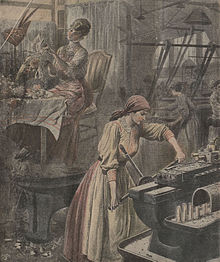
Back المرأة في فرنسا Arabic ফ্ৰান্সৰ নাৰী Assamese زنان در فرانسه Persian Femmes en France French Condizione della donna in Francia Italian فرانس وچ عورتاں PNB فرانس میں خواتین Urdu Fransiya ayollari Uzbek
 A portrait about the social classes of French women in 1916 | |
| General Statistics | |
|---|---|
| Maternal mortality (per 100,000) | 8 (2010) |
| Women in parliament | 38.65% (2017) |
| Women over 25 with secondary education | 75.9% (2010) |
| Women in labour force | 61.4% (employment rate OECD definition, 2016)[1] |
| Gender Inequality Index[2] | |
| Value | 0.083 (2021) |
| Rank | 22nd out of 191 |
| Global Gender Gap Index[3] | |
| Value | 0.791 (2022) |
| Rank | 15th out of 146 |
| Part of a series on |
| Women in society |
|---|
 |
The roles of women in France have changed throughout history. In 1944, French women obtained women's suffrage. As in other Western countries, the role of women underwent many social and legal changes in the 1960s and 1970s. French feminism, which has its origins in the French Revolution, has been quite influential in the 20th century with regard to abstract ideology, especially through the writings of Simone de Beauvoir. In addition the article covers scholarly work on topics in history, education, reproductive rights, families, feminism, domestic violence, religion and art.
- ^ "LFS by sex and age - indicators". Archived from the original on 2019-05-25. Retrieved 2016-11-19.
- ^ "Human Development Report 2021/2022" (PDF). HUMAN DEVELOPMENT REPORTS. Retrieved 8 November 2022.
- ^ "Global Gender Gap Report 2022" (PDF). World Economic Forum. Retrieved 9 February 2023.